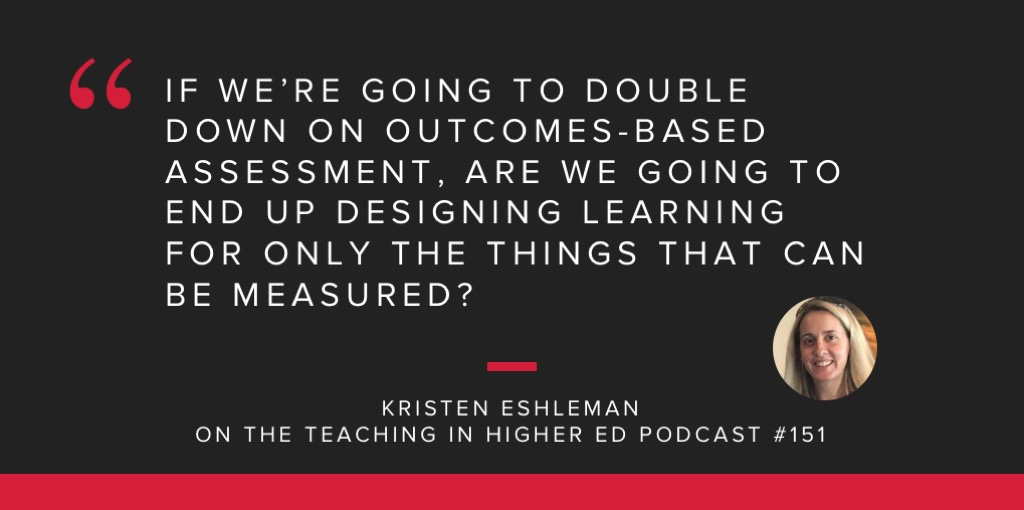Podcast (tihe_podcast):
Play in new window | Download | Transcript
Subscribe: Apple Podcasts | Spotify | RSS | How do I listen to a podcast?
 Kristen Eshleman explores meaningful measures of accountability on episode 151 of the Teaching in Higher Ed podcast.
Kristen Eshleman explores meaningful measures of accountability on episode 151 of the Teaching in Higher Ed podcast.
Quotes from the episode
Are there ways we could be accountable for the things we value most?
–Kristen Eshleman
If we’re going to double down on outcomes-based assessment, are we going to end up designing learning for only the things that can be measured?
–Kristen Eshleman
Accept the vulnerability that allows for openness in learning.
–Kristen Eshleman
Teaching has to adjust and adapt.
–Kristen Eshleman
Resources
- TIHE episode with Laura Gogia: Connected Learning for the Curious
- Exploring Meaningful Measures of Accountability
- TIHE 007: Personal knowledge mastery
- TIHE Article: My Updated Personal Knowledge Management System
- W. Brian Arthur
- Keynote Speech: Combining Complexity Theory with Narrative Research with David Snowdon
- Harvard Business Review: A Leader’s Framework for Decision Making
- Santa Fe Institute: Complex Adaptive Systems
- Cynefin Framework
- SenseMaker
- Davidson Digital Learning R + D
Are You Enjoying the Show?
Rate/review the show. Please consider rating or leaving a review for the Teaching in Higher Ed podcast on whatever service you use to listen to it on (iTunes, Stitcher, etc.). It is the best way to help others discover the show.
Give feedback. As always, I welcome suggestions for future topics or guests.
Subscribe. If you have yet to subscribe to the weekly update, you can receive a single email each week with the show notes (including all the links we talk about on the episode), as well as an article on either teaching or productivity.




Hi Bonnie,
Your podcast has been a treasure chest, even for this teacher of 40+ years (or maybe I should save “especially for.” This week’s episode with David Snowden came along just as I am finishing up grades and loose ends for the spring semester.
In my group/team communication class, I have replaced the traditional group project with a service project in which students must select a nonprofit organization that works for the common good, and then organize an event to support the organization. Because it is student driven, the schedule in the syllabus is loosely structured, as classroom time is largely dictated by the needs of the groups as they are working on the project. I introduce course content as needs arise in the process. It is open-ended and requires change of direction more than once during the semester.
The model discussed by Snowden and his group gives me the perfect framework for making sense of the semester process in this class. Every time I teach this class, we hit a point during the semester when I think it’s about to go off a cliff, but in the end it works out. For a number of reasons, especially the student “buy-in”, it is a rewarding experience for the students and me.
Although I introduce some of the best practices in the beginning, the Cynefin framework explains why they have limited effectiveness, especially once the groups get engaged in the process. Although some of the students see the class as chaotic at times, I think the complexity context perfectly fits. The behaviors and skills required for the leader in the complexity model fit what has worked with the class. I do a lot of monitoring of the group process, asking questions, and listening to concerns. Fortunately, I have a high tolerance of ambiguity!
Thanks again for your podcast and show notes!
Thanks for the kind words, Pam. Kristen will also be glad to know that her sharing of Snowden’s resources was helpful.